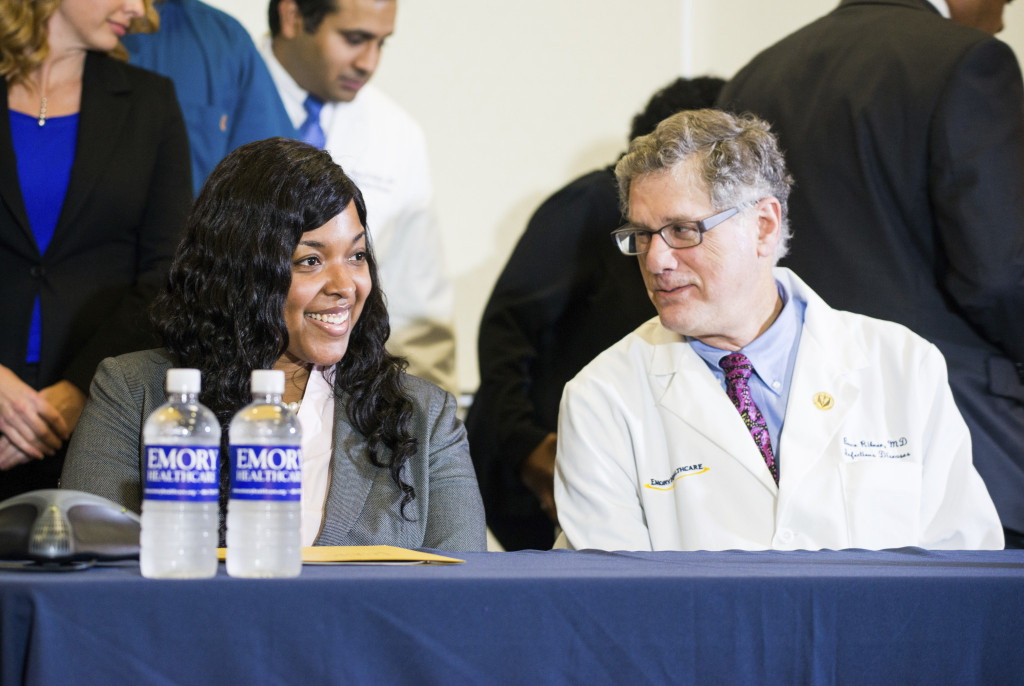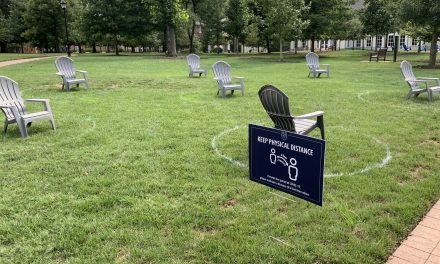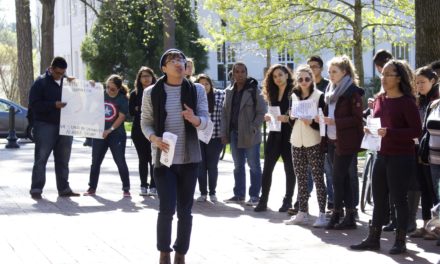
Nurse Amber Joy Vinson, the fourth Ebola patient treated at Emory University Hospital, looks on as Dr. Bruce Ribner, medical director of Emory’s Serious Communicable Disease Unit, discusses Vinson’s release from treatment and answers questions from the media. / Photo by Steve Shan, Assistant Photography Editor
By Harmeet Kaur
Digital Editor
The fourth patient to be treated for the Ebola virus at Emory University Hospital (EUH) was discharged on Oct. 28.
The patient, Amber Vinson, was the second nurse from Texas Health Presbyterian Hospital Dallas to contract the virus while caring for a patient who was infected while in Liberia. She was also one of the first people to contract the disease in the United States. As reported in an Oct. 28 Wheel article, Vinson arrived at EUH on Oct. 15 for treatment in the same isolation unit as Dr. Kent Brantly, Nancy Writebol and a third unidentified patient.
Vinson and Bruce Ribner, medical director of the Serious Communicable Disease Unit at EUH who led the team of health care workers that treated Vinson and the other three Ebola patients at Emory, spoke at a press conference at EUH on Oct. 28 following Vinson’s release.
“After a rigorous course of treatment and thorough testing, we have determined that Ms. Vinson has recovered from her infection with Ebola virus, and that she can return to her family, to the community and to her life, without any concerns about transmitting this virus to any other individuals,” Ribner announced.
Joined onstage by the team of Emory Healthcare workers who helped care for Vinson and the other Ebola patients, Ribner also addressed the public fear surrounding the Ebola virus and Emory’s protocols in treating the disease in his statement. Vinson followed Ribner’s remarks by thanking the health care staff at Emory in a brief statement of her own.
“As a nurse, and now as someone who has experienced what it’s like to be cared for through a life-threatening illness, I am so appreciative and grateful for your exceptional skill, warmth and care,” she said.
Vinson went on to emphasize the still-ongoing Ebola outbreak in West Africa and the work that needs to be done in containing it.
“While this is a day for celebration and gratitude, I ask that we not lose focus on the thousands of families who continue to labor under the burden of this disease in West Africa,” she added.
After both Ribner and Vinson delivered their statements, Ribner fielded questions from the media. Vinson remained onstage, although she did not take any questions.
In response to a question about why Vinson and the other Dallas nurse, Nina Pham, were able to recover so quickly, Ribner explained that the nurses’ relatively young ages were likely contributing factors. He added that the amount of virus that Vinson and Pham were exposed to was significantly less than what people in West Africa who contract the disease experience.
“We know that younger patients do much better than patients who are older,” Ribner explained. “The other hypothesis we have is that [Vinson] was wearing personal protective equipment during care of her patient in Dallas.”
Ribner was also asked about what Emory has learned in caring for the four Ebola patients. He replied that, previously, the mindset of medical professionals was that if patients with Ebola were ill enough to require dialysis or other life-saving procedures, they were thought to be incurable. Ribner said this attitude, however, has changed.
“We have changed the algorithm for how aggressive we are willing to be in caring for our patients with the Ebola virus disease,” he noted.
Ribner also discussed how the health care team determined which experimental agents to use in treating each individual patient with the Ebola virus. He explained that the team evaluates each patient for which experimental agents would be most appropriate. He added that Emory has been in constant collaboration with the Food and Drug Administration (FDA), the Centers for Disease Control and Prevention (CDC) and other organizations in caring for the patients.
“We don’t have any magic formula,” Ribner said. “On a case-by-case basis, we look at the agents that are available, we look at the setting – we look at the viral loads and lots of other clinical factors. Then we make an individualized decision.”
Following the diagnoses of Pham and Vinson, reports from Texas Presbyterian Hospital Dallas indicated that the nurses contracted the virus because of a lack of fully protective gear.
The World Health Organization (WHO) estimates that as of Oct. 27, there have been nearly 14,000 cases of the Ebola virus globally, with almost 5,000 deaths.
– By Harmeet Kaur, Digital Editor
The Emory Wheel was founded in 1919 and is currently the only independent, student-run newspaper of Emory University. The Wheel publishes weekly on Wednesdays during the academic year, except during University holidays and scheduled publication intermissions.
The Wheel is financially and editorially independent from the University. All of its content is generated by the Wheel’s more than 100 student staff members and contributing writers, and its printing costs are covered by profits from self-generated advertising sales.





